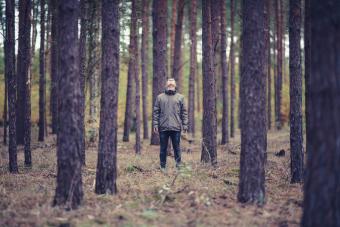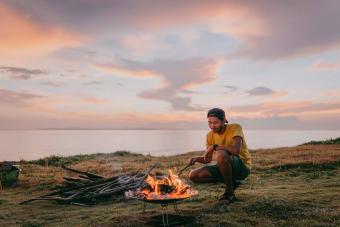
Getting lost is a primordial fear, right up there with the forces of nature like fire, water, and the dark, and there's never a time to be more afraid of getting lost then when you're traveling throughout the wilderness. Thankfully, if you were ever to get lost, you certainly wouldn't be the first person to veer off the beaten path. These survival tips for when you're lost in the wilderness should help you keep your cool enough to find your way back.
Ways to Prevent Getting Lost in the Wilderness
Of course there are important things to remember for when you actually get lost hiking in the backcountry; however, it's never too late to take the necessary precautions to prevent that from ever happening in the first place. As outdoor survival expert and author Randy Gerke explains, "a little pre-planning goes a long way." Here are some of the preparations that Gerke believes will give you the best chance of staying on track from the get-go.

Map Your Route
"Always carry a map of where you are," Gerke says. Having your route mapped out should help you stay on track and quickly put you back on track in case you meander off of it.
Designate an Emergency Contact
You should entrust your plans with someone, giving the expected route you're going to take, the way you're getting to and from the location, and when you're expected to get back. That way, if you can't seem to get yourself back on track, there'll be people who know to start looking for you sooner rather than later.
Be Aware of Your Surroundings
Gerke instructs you not to just look at your feet when hiking through the forest. "Look for prominent landmarks that are easy to recognize" and note them so you can get a sense of your location should you come back to them in an unexpected way.
Always Over Prepare
Gerke believes that you should, "always be prepared by carrying lightweight survival items with you." While you hope the unexpected never happens, if it does, you want to be ready and having things like a beacon locator or GPS system in your pack can help you should the situation ever arise.
What to Do When You Get Lost in the Wilderness
Although the idea of getting lost in the wilderness--especially by yourself--can make your skin crawl in a second, Randy Gerke is here to cut through the fear. "Being lost is no respecter of person; it can happen to the experienced outdoorsman as well as the novice." Yet, when it does happen, you need to keep your wits about you and never give up on finding a solution. Hopefully, if you follow these tips, you should get back on track in just a few minutes.
Stop Immediately
Having been on many backcountry excursions himself, Gerke reveals that the very first thing you should do when you get lost is to stop. Don't let your hubris or your fear of admitting that something might be off keep you going in the wrong direction. The second you think you're off your planned route, stop and take a deep breath. Don't fuel the panic by dwelling on something going wrong; rather, use your brain and start to problem solve.
Try to Determine Your Location
Next, you want to try your hardest to determine your location. This is where mapping out any identifying landmarks and paying attention to your surroundings can come in handy. If you have a map of the area, now's the time to start matching up what you're seeing with the features on the map. If you're a seasoned camper, Gerke says you should "establish where north, south, east, and west are." However, all isn't lost if you don't immediately recognize where you are.
Survey Your Location
Perhaps the reason you don't recognize where you are is because you haven't been paying attention to your surroundings. Even if you have been, it's important that you take stock of what's around you right after you realize you're lost. Additionally, you should "mark the spot where you are with something that's easy to see." Once you have your marker set, begin to walk in increasingly large circles around the marker, taking in all that you can see. However, Gerke stresses the importance of never loosing sight of your marker. At the very least, you'll be able to return to the place you first became lost and your tracks might lead others to your location.
Make a Camp
If you haven't managed to get back on track within thirty minutes to an hour, you should make camp. Gerke instructs that you should make camp while it's still light out, and to build both a shelter and a fire. The fire may attract people to your location and also ward off animals in the night. After all, the last thing you want to do is to be caught in the darkness with nowhere to rest.

Begin Signaling for Help
Once you've made your camp, it may feel like there's nothing else you can do but wait for someone to find you. However, you shouldn't let any fear or discouragement keep you from trying to signal to others where your location is to help them find you faster. Gerke says that "three of anything is generally recognized as a distress signal" so you can try putting "three fires in a row or in a triangle, three whistle blasts at regular intervals, three yells or three gunshots." Ultimately, Gerke explains that you should "be patient and [not] give up."
Be on the Lookout for Danger
While you wait for help to arrive, you need to be on the lookout for signs of dangerous animals or environmental concerns. Things like unexpected rainstorms can seem harmless at first, but without knowing the conditions of your exact location, might put you in a life-threatening situation. In fact, Gerke admits that "by far the most dangerous threat to humans is the environment" as "the effects of cold and heat cause more deaths than all of the animal related hazards combined."
Getting Out Starts With Getting Calm
Getting lost in the wilderness is an appropriately frightening experience, but with the proper preparations and tools under your belt, you should be able to make it out relatively unscathed. Most importantly, remember to keep calm and think your way through it - you're the person who can get yourself back on track quicker than anyone else can.







